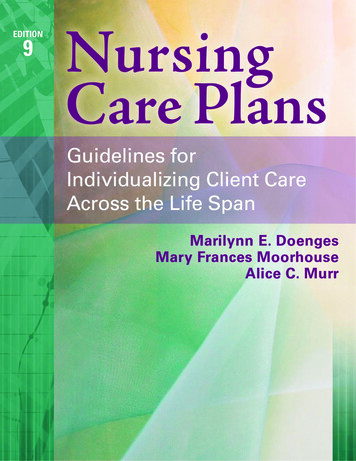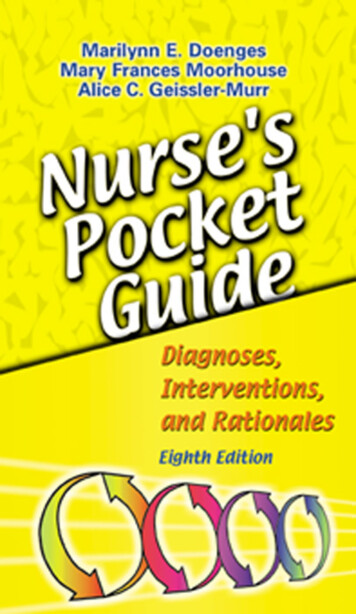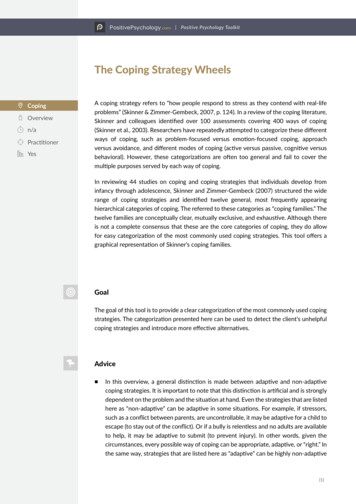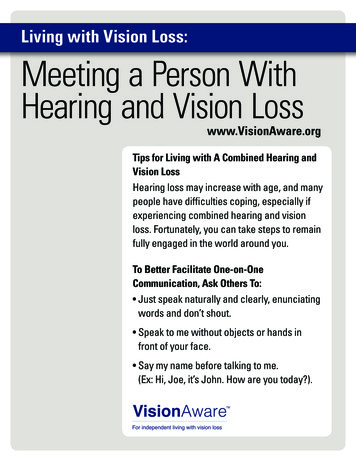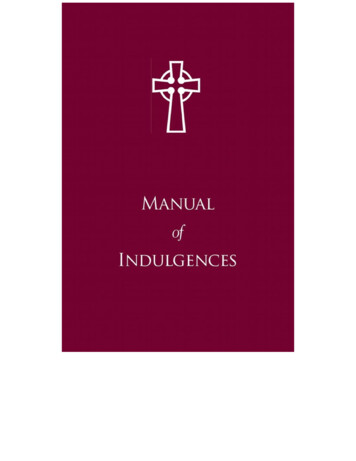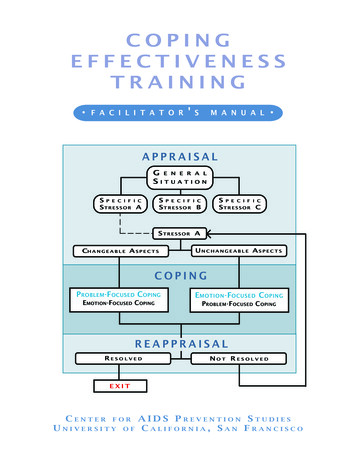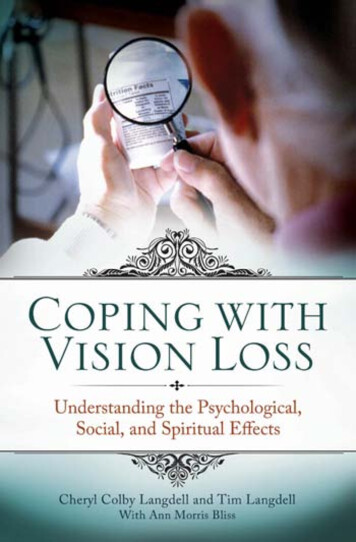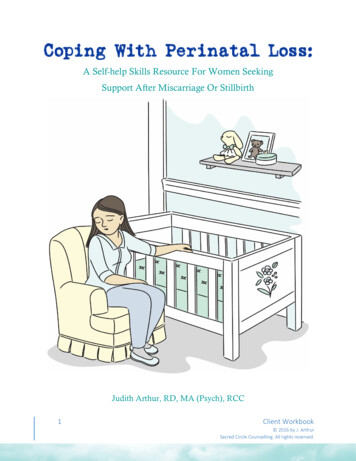
Transcription
Coping With Perinatal Loss:A Self-help Skills Resource For Women SeekingSupport After Miscarriage Or StillbirthJudith Arthur, RD, MA (Psych), RCC1Client Workbook 2016 by J. ArthurSacred Circle Counselling. All rights reserved.
Coping With Perinatal Loss: A Self-help Skills Resource for Women Seeking Support AfterMiscarriage or Stillbirth.Copyright 2016 by Judith C ArthurAll rights reserved.Citation:Arthur, J. C. (2016). Coping With Perinatal Loss: A Self-help Skills Resource for Women SeekingSupport After Miscarriage or Stillbirth. Surrey, Canada.Front cover illustration reproduced/adapted with permission from the Best Start ResourceCentre.Judith Arthur would like to thank her faculty supervisor and expert reviewer who gave his timeand support to this workbook. Dr. Peter Hall PhD, Dean of the Faculty of Behavioural Sciences, Yorkville UniversityJudith Arthur also thanks all those who contributed to the development of this booklet.Workbook illustrations on front cover, page 13, page 15, page 26, and page 28 were createdby Claire Louise Milne.Copies of this workbook can be downloaded at no cost from: sacredcirclecounselling.comThis resource is intended for: Women dealing with a pregnancy loss or stillbirth and Clinicians and service providers working with women coping with pregnancy loss or stillbirth inone-on-one or group settings. Concerned partners, family members or friends may also find this resource helpful.This workbook is meant to provide accurate information about grief and perinatal. It is not atreatment plan. If expert assistance or treatment is needed, the services of a competent health careprofessional should be sought.2Coping with Perinatal Loss 2016 by J. ArthurSacred Circle Counselling. All rights reserved.
Table of ContentsIntroduction: What is Grief.4What is Perinatal Loss . 5What is Perinatal Bereavement. 5Perinatal Bereavement, Gender Differences .6Worden’s Four Tasks of Mourning .7The Disenfranchised Grief of Perinatal Loss .7Common Grief Reactions . 8Physical Reactions . 9Emotional Reactions .10Cognitive Reactions 12Social Reactions 13Spiritual Reactions .14Coping with Grief Reactions 15Giving Yourself Permission to Mourn 16Honoring Your Loss: Restorative rituals .18Leaning into Grief .23Managing Triggers and Life Markers .24Healing With Gentle Self-Care .26Resources . .32References .353Coping with Perinatal Loss 2016 by J. ArthurSacred Circle Counselling. All rights reserved.
Introduction: What is Grief?Image Source: or-professionalsGrief is one of the most profound and painful experiences that we face as human beings. Itstems from the love or bond that we share with another person. When we are separated bydeath from a loved one, it is natural to feel the intense pain of grief. The grieving process isoften described as a journey because it is marked by some common emotions and behaviorsthat are characteristic of grief. For example, individuals who are grieving often experiencepsychological distress and may have constant thoughts of the person who died. On thejourney of grief, the task of the mourner is to take steps down a foreign pathway that is oftenunexpected and unwelcomed. Although grief is a universal experience, grieving is veryindividual, so there are observable differences in the course, duration, and intensity of griefwhich is shaped by one’s gender, cultural and belief systems, one’s relationship to thedeceased, the circumstances surrounding the loss and many more factors. If you are readingthis workbook, you have likely lost a pregnancy or expected baby, and are experiencingprofound grief. This workbook was created to offer a way through your grief during a timewhere there are often more ‘whys’ than ‘hows’.4Coping with Perinatal Loss 2016 by J. ArthurSacred Circle Counselling. All rights reserved.
What is Perinatal Loss?Perinatal loss occurs when a pregnancyunexpectedly ends via a miscarriage, or a babyunexpectedly dies before or after delivery.Perinatal loss is different than other losses in that itinvolves the relinquishment of your plans, hopesand dreams for a future baby as well as the abruptdisruption of love and attachment bonds sharedbetween mother and her expected baby 1. Formany couples, their expected baby is viewed asmember of the family. Research indicates that theImage Source: cy-losses/grief associated from losing an expected baby cancomplex and enduring, but there is hope 2. Although there is no timeline for grief, it tends tolessen in intensity with time for most grievers 3.What is Perinatal Bereavement?Perinatal bereavement refers to the period after perinatal loss during which the expectantmother mourns the loss of her expected baby 4. Because of the burgeoning bond betweenmother and expected baby is a unique and powerful experience, a miscarriage and stillbirthcan feel life-shattering and is marked with waves of emptiness, sadness, helplessness, andlonging. Contrary to popular belief, the duration of a pregnancy is not related to the level ofgrief experienced by the expectant mother 3.5Coping with Perinatal Loss 2016 by J. ArthurSacred Circle Counselling. All rights reserved.
Perinatal Bereavement: GenderDifferences and the Impact onRelationshipsThere are significant differences in the way women and men experience and process perinatalloss. Research indicates that the grief experienced by women who have lost a baby tends tobe more intense and longer lasting compared to men5. However, active engagement inprenatal procedures such as ultrasound imagining tends to strengthen the bond betweenbaby and both parents which may increase of the intensity of grief experienced by expectantfathers after perinatal loss5. Although women and men experience similar reactions afterperinatal loss including sadness, helplessness, emptiness, and anger, women often experienceguilt whereas this is less common for men5.The loss of baby can be a strain on a romantic relationship and may be a risk factor for thebreak-up of a relationship5. However, emotional support between couples after perinatal lossis an important protective factor to sustain the relationship through the bereavement process5.When couples are able to create space in their relationship to share their grief with eachother, this can strengthen the relationship and promote healing5.6Coping with Perinatal Loss 2016 by J. ArthurSacred Circle Counselling. All rights reserved.
Worden’s Four Tasks of MourningTo understand the difference between grief and mourning, think of a door. One side of adoor faces the outside world and the other side of a door can only be seen from the inside.Grief is like the inside of the door because it is an internal private experience that reflects thethoughts and feelings of the griever. Mourning is like the outside of the door because it is anexternal open experience that happens every time you express your grief through tears or talkabout the pain of your loss.In his book, Grief Counselling and Grief Therapy: A Handbook for the Mental HealthPractitioner, Dr. J. William Worden, a leading expert on death, grief and bereavement,outlined the following tasks of mourning 6 which provide a roadmap for mourners tounderstand the grieving process: To accept the reality of the loss 6 To process the pain of grief 6 To adjust to a world without the deceased 6 To find an enduring connection with the deceased in the midst of embarking on a newlife6The Disenfranchised Grief ofPerinatal LossDr. Kenneth Doka, a leader in the field of grief, has increased our awareness aboutdisenfranchised grief; this term refers to a death that is not validated by society as a significantloss 7. Many expectant mothers who experience a miscarriage or stillbirth notice that somefamily, friends, co-workers, and even health professionals fail to acknowledge the expected7Coping with Perinatal Loss 2016 by J. ArthurSacred Circle Counselling. All rights reserved.
baby that was lost which can feel distressing, disappointing, and frustrating. Disenfranchisedgrief tends to make grieving mothers feel isolated at a time when social support is sorelyneeded and can be healing. Generally, North Americans have great discomfort andapprehension with matters concerning death and grief. Typically, people are unsure of “whatto say”, and fear doing or saying something that will stir up grief and make matters worse. Asa result, many bereaved mothers experience a deafening silence which adds even more painto an already difficult situation.Over the past 30 years, medical research has helped to increase awareness of thepsychological distress experienced during and after perinatal loss which can increase the riskof developing mental health disorders 8. Although disenfranchised grief is still a reality, overtime, raising awareness may help to shift how society views perinatal loss and responds to it.Common Grief Reactions:During pregnancy, an expectant mother experiences numerous physical, emotional,psychological, and social changes 9. Since your body has been supporting another life, it willtake time after a miscarriage or stillbirth for your body to return to a state of hormonalbalance which may affect you emotionally and physically.Similarly, grief associated with perinatal loss is experienced holistically. Meaning, it affects thebereaved on a physical, emotional, cognitive, social, and even spiritual level.8Coping with Perinatal Loss 2016 by J. ArthurSacred Circle Counselling. All rights reserved.
Physical ReactionsThe shock of losing a baby can impact the physical body in many ways. Some examples ofcommon physical reactions of grief include 6: muscle tension changes in appetite dry mouth fatigue or lack of energy restlessness insomnia or sleeping too much hollow feeling in the stomach pain diarrhea or constipation nausea, vomiting muscle weakness frequent sighing or shortness of breath crying or the inability to cry irritability tight feeling in the throat or chestJust as each grieving woman is unique and her individual loss is different, the physicalreactions to grief often present differently for each woman.9Coping with Perinatal Loss 2016 by J. ArthurSacred Circle Counselling. All rights reserved.
Emotional ReactionsAfter a miscarriage or stillbirth, you will likely experience a roller coaster of emotions as yougrieve. Like waves in the ocean, your emotional reactions will peak and recede over and overagain in the hours and days that follow.The loss of an expected baby or the death of an infant can result in intense emotionsincluding 6: sadness longing emptiness feeling overwhelmed loneliness shock helplessness depression anxiety, anxiety about future family planning anger resentment feeling betrayed guilt frustration regret fear numbness desire to join deceased loved oneExperiencing perinatal loss can lead to anxiety about future pregnancies, difficulty sleeping,depression, guilt, and shame. Although grief shares some similar characteristics withdepression, there are distinct differences between the grief and clinical depression. For10Coping with Perinatal Loss 2016 by J. ArthurSacred Circle Counselling. All rights reserved.
example, the intensity of grief tends to lessen over time whereas clinical depression typicallydoes not lessen with time alone.In his book, The Depression of Grief: Coping with Your Sadness and Knowing When to GetHelp, Psychologist, Dr. Alan Wolfelt, makes the following distinction between grief and clinicaldepression 11:Normal GriefClinical DepressionYou have normal grief if you:You may be clinically depressed if you:Respond to comfort and supportDo not accept supportAre often openly angryAre irritable and complain but does notdirectly express angerRelate your depressed feelings to lossDo not relate your feelings of depression toexperiencea particular life eventCan still experience moments of enjoymentExhibit an al-pervading sense of doomin lifeExhibit feelings of sadness and emptinessProject a sense of hopelessness and chronicemptinessMay have transient physical complaintsHave chronic physical complaintsExpress guilt over some aspect of the lossHave generalized feelings of guiltFeel a temporary loss of self-esteemFeel deep and ongoing loss of self-esteem(Wolfelt, 2014, p. 36)If you think you are depressed, read the companion workbook, “Managing Depression: ASelf-help Skills Resource for Women Living With Depression After Perinatal Loss” for acomprehensive approach to managing depression. Also, contact your family doctor andmental health professional (counsellor or psychologist) for treatment options.If you are having thoughts of ending your life, harming yourself or another person, please callyour local crisis line or 911 immediately.11Coping with Perinatal Loss 2016 by J. ArthurSacred Circle Counselling. All rights reserved.
Cognitive ReactionsPsychological reactions to grief can make youfeel like “you’re going crazy”. This feeling canoccur because the shock of your loss placesgreat demands on the brain to make senseout of an experience that feels unreal. Youmay not be able to stop replaying the eventssurrounding your loss over and over again.For many women, this leads to retelling theirstory of loss repeatedly.Common cognitive reactions to grief thatyou may experience include 6:Image Source: https://fiscafamily.wordpress.com/2011/07/12 Confusion Frequent retelling of what happened Feeling detached Feeling a sense of unreality Disbelief Constant thoughts of the lost baby Reflecting on previous losses Feeling crazy or like losing one’s mind Strong desire to keep busy Indifferent to daily activities Feeling numb Forgetfulness and poor concentration Feeling unmotivated Grief avoidanceCoping with Perinatal Loss 2016 by J. ArthurSacred Circle Counselling. All rights reserved.
Social ReactionsAfter a perinatal loss,women can feel like thereis a massive whiteelephant in the room thatvery few people arewilling to acknowledge.Socially, perinatal lossexperiencers are at risk ofbeing isolated becausetheir grief may not beIllustration reproduced/adapted with permission from the Best Start Resource Centrevalidated by people intheir support network 12. Being surrounded by a sea of people who do not recognize your lossas a painful life event can feel disturbing and lonely.After perinatal loss, you may also experience intense reactions to seeing other pregnantwomen and dealing with friends who are pregnant or have a healthy new baby. This may leadyou to avoid socializing with certain friends which can be upsetting and make you feel isolatedin your grief.Common social reactions to grief for bereaved mothers may include 6:13 Distancing self from others Dependency on others Lack of interest in other’s activities Taking up a causeCoping with Perinatal Loss 2016 by J. ArthurSacred Circle Counselling. All rights reserved.
Heightened sense of responsibility (focused on care-taking to avoid grief) Feeling self-conscious Changes in friendshipsSpiritual ReactionsWhether you follow a religious path, a spiritual tradition, or have an unstructured belief systemabout life and death, most perinatal loss experiencers find themselves asking one word afterthe death of an expected baby: why. Grief makes us painfully aware of the mystery of life, andbrings up doubt about things we thought we already knew with certainty. For some mourners,grief can lead to a crisis of faith and others may go on a spiritual quest to better understandthe purpose and meaning of life. Experiencing loss can also make us more aware of our ownmortality.Some common spiritual reactions to grief may include 6: Blaming or feeling angry at God, Life, or the Universe Questioning pre-existing spiritual or religious beliefs Experiencing a lack of meaning or direction Feeling your lost loved one’s presence Desire to maintain a bond with your lost loved oneReflection ExerciseCan you relate to these grief reactions?What are some of the physical, emotional, cognitive, social, and spiritual reactions that you areexperiencing?What thoughts and feelings came up for you when you reflected on your grief reactions?14Coping with Perinatal Loss 2016 by J. ArthurSacred Circle Counselling. All rights reserved.
Coping with Grief ReactionsGrief is extremely painful and often overwhelming; however, taking steps to express what isgoing on internally can help to prevent a delayed grief response to perinatal loss and loweryour risk of having a complicated grieving process.The following strategies can helpful in working through perinatal bereavement: Work with a counsellor who specializes in bereavement support. A grief counsellor can helpto guide you through thegrieving process and customizetherapy for your uniquesituation. Join a local grief supportgroup for women who haveexperienced perinatal loss.Positive social support canlower your risk of complicatedgrief 3 (see support groupIllustration reproduced/adapted with permission from the Best Start Resource Centreresources on page 34 of thisworkbook for details). Join an online perinatal loss community such as the Miscarriage Association or Faces ofLoss, Faces of Hope (see website resources on page 33 of this workbook for details). Join a social media group that is dedicated to pregnancy loss and stillbirth.15Coping with Perinatal Loss 2016 by J. ArthurSacred Circle Counselling. All rights reserved.
Find local perinatal loss events in your community to participate in raising awareness aboutmiscarriage and stillbirth. October 15th is National Pregnancy and Infant Loss RemembranceDay, so your community may have scheduled events on this day.Giving Yourself Permission toMournCreating the space to mourn your lostbaby is about validating the preciouslife that died before you had anopportunity to know her or him inphysical form. In her book,Remembering Well: Rituals forCelebrating Life and Mourning Death,Sarah York, reminds us that “whetheror not the child has breathed or beengiven a name, he or she has lived”.Image Source: J. ArthurBecause the grief associated withperinatal loss is often not socially validated, it is important for bereaved mothers to take activesteps towards acknowledging who and what was lost. The above photo depicts a memorialtable that was set up in the home of a bereaved mother who had a miscarriage in her secondtrimester. This memorial table was festooned with a candle, framed art print of a little girl,flower garland, teddy bear, vase of pink roses, an open hands sculpture holding a turquoiseheart, and an endless knot figurine. Each object represented some aspect of significancerelated the loss of her baby girl. The goal of creating a memorial table is to design a tangible16Coping with Perinatal Loss 2016 by J. ArthurSacred Circle Counselling. All rights reserved.
imprint that expresses the developing hopes, dreams, and the future that was environed aswell as the grief that this lost baby girl left in the heart and mind of her bereaved mother. Amemorial table can be transitioned into a memory box which can be pulled out from time totime to remember your lost baby. The effort of creating a memory table provides anopportunity for grief processing and transitioning the objects from the table into a memorybox can provide validation of your lost baby’s presence in your life 9.Mothers who experience a stillbirth are increasingly being given the opportunity to hold theirdeceased baby, take photographs, remove a locketof hair, and make footprints or handprints to signifythe importance of the life that has been lost.Studies indicate that this can be healing for somemothers, but distressing for others 11. Nobodyknows what is right for you, better than you. If theImage Source: sion to hold your baby and take mementos wasnot right for you, it is possible to adapt the memorial table idea for your situation. Simply takethe time to think of objects that were significant to you or you felt drawn to during yourpregnancy. The point is that this should be a very personal gathering and assembling ofmeaningful things that represent the bond that you shared with your lost child. In that way,each time you see your memorial table, you are consciously and unconsciously honoring yourloss.Reflection ExerciseThink about how you can tangibly acknowledge your lost baby, listen for the thoughts thatsurface, and take steps to honor your own intuitive wisdom. What do you feel guided to do?17Coping with Perinatal Loss 2016 by J. ArthurSacred Circle Counselling. All rights reserved.
Honoring your Loss: RestorativeRitualsRestorative rituals include activities that are guided by a profound purpose to mark atransition 10. For example, lighting a candle in remembrance of your lost baby on his or herexpected due date could be a ritual that you perform each year. In the grieving process,rituals are acts that pay tribute to the person who died, honor your loss, help you deal withunfinished business, and can symbolize an important life marker 11. There are some detailedexamples of rituals here that may be helpful in honoring your loss.Image Source: J. Arthur18Coping with Perinatal Loss 2016 by J. ArthurSacred Circle Counselling. All rights reserved.
Stone and Petal RitualThe Stone and Petal ritual is a way to symbolically release a burden associated with yourgrieving process and reflect on something in life that still brings you joy.When we are hurting, many of us are drawn to thehealing qualities of water. Think of the soothingrhythmic sounds of lapping waves or the crashing surfof the ocean. Bodies of water has the amazing capacityto hold sea life, raindrops, and reflect the nature thatsurrounds it. The song, The Ocean Rejects No River,speaks to the receptivity of water as well as the ebb andflow associated with water on the planet. Bodies ofwater are also known as the womb of the universebecause water carries and gives rise to life. The stoneand petal ritual invites you to return to the water torelease as well as reflect. Choose your favorite body of water to performthe ritual Image Source: J. ArthurGather one or more stones. Let the stones pickyou (choose whichever ones stand out to you) Gather several of your favorite flowers and remove the petals Stand at the edge of your favorite body of water, holding the stone(s) in your hand.Close your eyes and think about a burden that you are carrying associated with yourgrief which you are ready to release. It can be anger, regret, shame, or anything else19Coping with Perinatal Loss 2016 by J. ArthurSacred Circle Counselling. All rights reserved.
that feels right to you. Feel the weight of the stone(s) in your hand(s). Imagine thatyour stone represents whatever emotion that you selected. Think about how thisemotion weighs you down? When you are ready, throw the stone(s) into the water andwatch the ripples that it creates when it lands on the water. The burden that you justreleased was having a ripple effect on your life as well. Gather the flower petals in your hands. Notice how light they feel compared to thestones that you have just released. Think about the things in your life which bring youjoy, make you smile, and color your life with happiness. This may be a pet, naturewalks, wildlife, a person, place, thing or experience. In your mind’s eye, imagine howgood it feels to enjoy this pleasurable person, place, thing or experience. Gentlysprinkle the petals onto the water and watch them float on the surface of the water.The petals you have just sprinkled reflect the beauty and grace that remains in your lifeThis ritual reminds of that there is light in the darkness and it allows us to reflect on how wecan utilize nature for grief processing and healing.Balloon ReleaseUsing sharpie to write a message to your deceased baby on ahelium filled balloon. Your message may contain unresolvedissues like any wishes and regrets. Find a location that isspecial to you for the balloon release. This can be done on aspecial occasion or a day that you are feeling like you stillhave thoughts and emotions that need to be expressed.Image elease/20Coping with Perinatal Loss 2016 by J. ArthurSacred Circle Counselling. All rights reserved.
Tree or Flowering Shrub Planting CeremonyImage Source: J. ArthurNature is a metaphor for lifeand death which can beobserved through the seasonsand the cycle of life. Manybereaved parents find comfortin planting a symbol of hope tohonor their loss. The lilac bushpictured here was planted tomark the loss of an expectedbaby girl who died at 16-weeksgestation due to genetic abnormalities. Now, this tree is a living memorial of all the hopes anddreams this lost baby represented to her expectant mom and dad. The tree is a symbol oflove and hope for her parents, and its beautiful fragrant blossoms return each spring inmemory of how much her short life touched her mom and dad. A memorial plaque sits at thebase of the tree which is inscribed with her name, her expected due date, and an excerpt fromthe Michael Jackson song, “You are not Alone” which her mom sang to her each night whenshe was in her belly.Consider planting a tree or flowering shrub which blooms annually in the month that yourchild was expected to be born or was born. If you live in an apartment, townhouse, or condo,the living memorial can be planted in a pot, so that it can be easily transported wherever youreside.21Coping with Perinatal Loss 2016 by J. ArthurSacred Circle Counselling. All rights reserved.
Additional Suggestions for Rituals to Memorialize your Loss Buy a piece of jewelry that symbolizes your loss. Wearing a symbol close to your bodycan be a source of comfort Get a symbolic tattoo or body art Start a memorial walk or run in honor of the deceased baby Create a shadow box using baby shoes, mittens, or a sleeper Create a memorial web page Create an art piece that captures your experience Create a fairy garden Frame mementos like foot prints, handprints, photos, or lock of hair Create a memory quilt using the deceased baby’s clothing In honor of your deceased baby, donate homemade baked goods or volunteer yourtime to an organization that is meaningful to you Organize a walking labyrinth meditation and invite family and friendsReflection ExerciseCan you think of another ritual that would be meaningful for you to perform to honor yourlost baby?22Coping with Perinatal Loss 2016 by J. ArthurSacred Circle Counselling. All rights reserved.
Leaning into GriefDenial and grief avoidance can delay the natural grieving process after perinatal loss and maylead to complicated grief 3. For this reason, it is important to create outlets for expressionduring mourning. The goal is to accept or ‘lean into’ rather than fight, resist, or avoid the painof grief. Writing letters to your deceased baby can be a therapeutic outlet for mourningbecause it allows mourners to express unresolved feelings such as guilt or regret, saygoodbye, explore the depth of the loss, and express gratitude for their presence in your life 12.Writing letters to your deceased baby can promote acceptance and emotional awareness 12.Grief Activity: Letter WritingFind a quiet place to reflect where you will not be disturbed for about an hour.If you wish, you can prepare the space by lighting a candle, playing soothing music, andplacing some mementos nearby.Have a box of Kleenex close to where you will be sitting.Have writing instruments (pens and colored pencils) and blank paper ready. If you areuncomfortable writing using a pen and paper, the letter can be typed in a Word document.Have your cell phone, land-line phone, tablet, and laptop or desktop computer turned off oron silent mode not vibrate.Begin your letter with Dear 23Coping with Perinatal Loss 2016 by J. ArthurSacred Circle Counselling. All rights reserved.
Managing Triggers and LifeMarkersAlthough there is no prescribed timeline for grief to end, many perinatal loss experiencersmay find that their grief evolves over time. Much like a scar that remains after an injury, a partof your grief will likely stay with you for the rest of your life. The grieving process will bemarked with ups and downs, but it is important to be aware of and even plan for days whenyour grief may intensify.There are some occasions when perinatal loss experiencers feel the weight of their loss moreintensely. For example, Mother’s Day is often a trigger for women who have had a miscarriageor stillbirth because it is a day that serves as an acute reminder of who and what has beenlost. In addition, some people in your support circle may not know how to behave onMother’s Day. In particular, the lack of acknowledgement for childless women who havesuffered a miscarriage or stillbirth on Mother’s Day can be extremely hurtful because itminimizes the significance of the baby that was lost and the grief that remains.Special occasions or life markers that may be grief triggers for perinatal loss experiencersinclude: Mothers Day Father’s Day Anniversary of loss Special holidays such as Valentines Day, Halloween, Family Day Religious holidays such as Christmas, Easter, Hanukah, Ramadan, Chinese New Year,Diwali, and others 24Future pr
In his book, Grief Counselling and Grief Therapy: A Handbook for the Mental Health Practitioner, Dr. J. William Worden, a leading expert on death, grief and bereavement, outlined the following tasks of m ourning 6 which provide a
